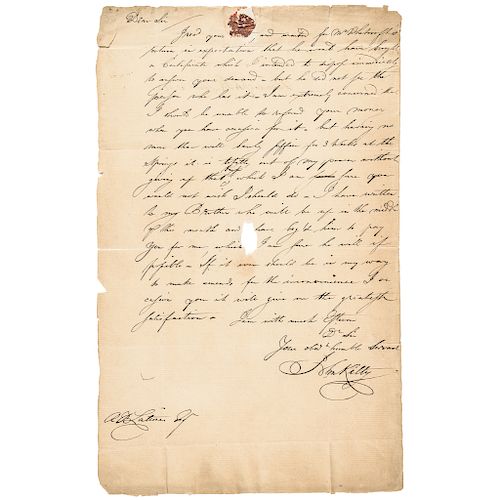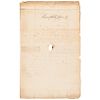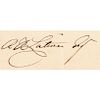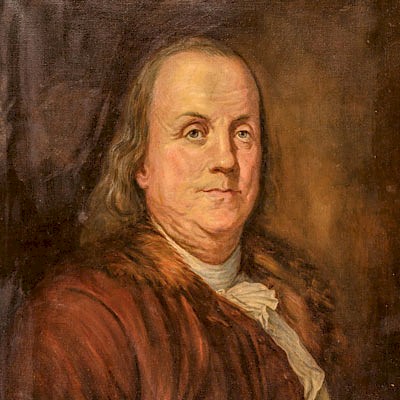c. 1785 JOHN KILTY of Maryland Revolutionary War General Autograph Letter Signed
Lot 53
Estimate:
$800 - $1,000
Absentee vs Live bid
Two ways to bid:
- Leave a max absentee bid and the platform will bid on your behalf up to your maximum bid during the live auction.
- Bid live during the auction and your bids will be submitted real-time to the auctioneer.
Bid Increments
| Price | Bid Increment |
|---|---|
| $0 | $10 |
| $200 | $20 |
| $300 | $25 |
| $500 | $50 |
| $1,000 | $100 |
| $2,000 | $200 |
| $3,000 | $250 |
| $5,000 | $500 |
| $10,000 | $1,000 |
| $20,000 | $2,000 |
| $30,000 | $2,500 |
| $50,000 | $5,000 |
| $100,000 | $10,000 |
| $200,000 | $20,000 |
| $300,000 | $25,000 |
| $500,000 | $50,000 |
About Auction
By Early American History Auctions
Aug 24, 2019
Set Reminder
2019-08-24 12:00:00
2019-08-24 12:00:00
America/New_York
Bidsquare
Bidsquare : Autographs, Colonial Currency, Political Americana, Historic Guns
https://www.bidsquare.com/auctions/early-american-history-auctions/autographs-colonial-currency-political-americana-historic-guns-4347
Historic Autographs • Colonial Currency • American Civil War Colonial Era • Revolutionary War • Political Americana • Black History Early American History Auctions auctions@earlyamerican.com
Historic Autographs • Colonial Currency • American Civil War Colonial Era • Revolutionary War • Political Americana • Black History Early American History Auctions auctions@earlyamerican.com
- Lot Description
Autographs
"John Kilty" ALS Revolutionary War General & A Founding Member of the Society of the Cincinnati From Maryland
JOHN KILTY (1756-1811). Revolutionary War Brigadier General, a Founding Member of the Society of the Cincinnati from Maryland; Members of the Governor's Council in 1785 together with Randolph B. Latimer; Appointed by President Washington on June 1, 1795 as Supervisor of the Revenue of the United States in Maryland.
c. 1785 Federal Period, Autograph Letter Signed, "John Kilty", measuring 8" x 13.25", 1 page, no place, Fine. Folds, fine partial fold splits, tape reinforcement on the blank reverse, edge chips, envelope red wax seal tear hole when opened slightly affecting two words. This financial content Letter is sent to fellow member of the Maryland Governor's Council Randolph B. Latimer, with his name boldly written on the blank reverse for use as an Integral Transmittal Envelope by Kilty, and Signed John Kilty at the conclusion of this Letter, reading in part:
"... in expectation that he would have brought a Certificate which I intended to dispose immediately to answer your demand, but he did not see the person who has it. I am extremely concerned that I should be unable to refund your money when you have occasion for it but having no more than will barely suffice for 3 weeks at the Springs it is totally out of my power without giving up that trip, which I am sure you would not wish I should do...".
In 1785, Kilty was chosen as one of five members of the Governor's Council, a prestigious office generally held by members of the colonial and state elite. The Governor at the time was William Smallwood, who had commanded the Maryland forces during the Revolutionary War; Charles Carroll of Carrollton, a fellow student at St. Omer's, was a member of the Senate. Perhaps the influence of one or the other aided Kilty's election, the five members of the Council (as well as the Governor) being chosen by vote of the house and senate. Among the individuals elected to serve with Kilty was former Governor William Paca (although Paca resigned his position on the council in order to take his seat as a member of the House of Delegates) and Randolph B. Latimer, to whom this very Letter is addressed.
JOHN KILTY (1756-1811) was the author of The Land-Holder's Assistant and Land Office Guide occupied as unusual a place among his peers in state government as his work does in the literary history of Maryland. Kilty was an Englishman, at a time when most colonists were native born, and a Roman Catholic in a predominantly Protestant state - one that had forcibly rejected rule by a Catholic proprietor nearly one hundred years before it rejected rule by a king. Nevertheless, he held significant appointed offices in state government for a period of nearly thirty years.
Kilty, the elder son of Capt. John Kilty and his wife Ellen Ahearn, was born in London in 1756. His father was a ship captain who sailed regularly to Annapolis on the ship Polly for at least five years before he settled in Anne Arundel County by 1771. Both John and his younger brother William were educated at the College of St. Omer's, a Jesuit school in France that educated English and colonial Catholics.
Kilty served with distinction in the American Revolutionary War, beginning with the third battalion of the Maryland militia in 1776 and retiring in November 1782 as a brigadier general in the eighth brigade of the militia, with service in the regular army as well. He was a founding member of the Society of the Cincinnati, and served as Secretary of the Maryland chapter in 1788.
In 1785, Kilty was chosen as one of five members of the governor's council, a prestigious office generally held by members of the colonial and state elite. The Governor at the time was William Smallwood, who had commanded the Maryland forces during the Revolutionary War; Charles Carroll of Carrollton, a fellow student at St. Omer's, was a member of the Senate.
Perhaps the influence of one or the other aided Kilty's election, the five members of the council (as well as the governor) being chosen by vote of the house and senate. Among the individuals elected to serve with Kilty was former Governor William Paca (although Paca resigned his position on the council in order to take his seat as a member of the House of Delegates) and Randolph B. Latimer.
Kilty served on the council until 1793 when, although elected to a new term, he declined to serve. He took the position instead of clerk of the council, which he resigned in 1795 when he was Appointed by President Washington on June 1, 1795 as Supervisor of the Revenue of the United States in Maryland.
Kilty's new position necessitated a move to Baltimore, where the family lived at 7 South Howard Street. Kilty's office, initially in his home, was located at 43 South Gay Street by 1799. In 1800, the family moved to 67 Hanover Street and Kilty relocated his office to 18 Light Street. The 1800 census recorded a household that included two boys and four girls, as well as ten slaves. Kilty returned to Annapolis in 1803 when he assumed the position as register of the Land Office for the Western Shore, a post that he held until his death in 1811. Kilty, appointed on 28 October, succeeded John Callahan, who had died on the 22nd.
Among his other public roles, Kilty acted in 1790 as a second with Philip Barton Key, for a duel between William Paca and Benjamin Ogle. The two succeeded in preventing the duel by clearing up the misunderstanding that had caused Paca to challenge Ogle, the circumstances of which they reported in a letter that appeared in the 17 June 1790 Maryland Gazette.
In 1791 Kilty was one of nineteen managers of a lottery to raise funds for building a school for Anne Arundel County orphans. The following year, Kilty was appointed to the newly-created position of register of deeds for the Maryland portion of the Federal District (Washington, D.C.).
In 1794 and 1795 Kilty was a captain of the Annapolis Light Dragoons, and acting Adjutant General, a position that ended in June 1795. In 1806, Annapolis voters chose Kilty as a member of the common council, and in 1807 he received an appointment as alderman. From June to December 1810, Kilty held the position of Brigadier General for Anne Arundel and Calvert counties in the Maryland militia, and served as adjutant general from 1810 to 1811.
- Shipping Info
-
Early American provides in-house worldwide shipping. Please contact us directly if you have questions about your specific shipping requirements.
-
- Buyer's Premium



 EUR
EUR CAD
CAD AUD
AUD GBP
GBP MXN
MXN HKD
HKD CNY
CNY MYR
MYR SEK
SEK SGD
SGD CHF
CHF THB
THB















